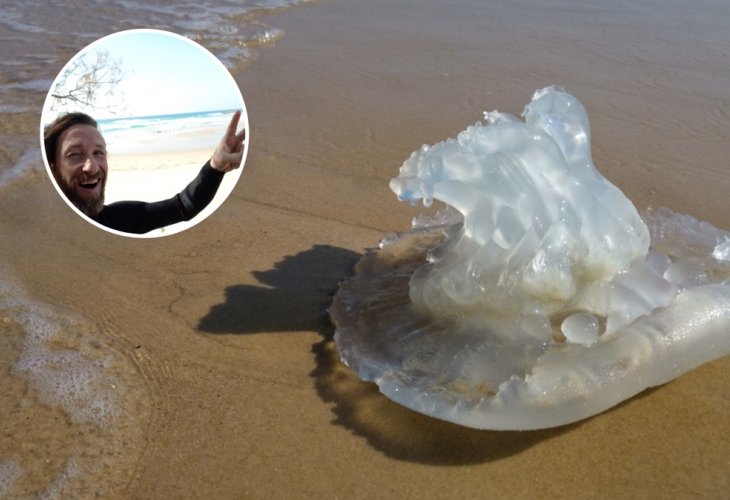Heading to the Beach? Jellyfish Expert Warns of a Rare Phenomenon
Dr. Dori Edelist has been studying jellyfish in Israel for 15 years, and this year he highlights a rare occurrence. Plus, discover how you can track jellyfish numbers at any given moment on Israel's beaches.
 (Background: shutterstock)
(Background: shutterstock)Should you go to the beach, or is it swarming with jellyfish? If so, what types of jellyfish are currently in the water, and are they stinging and dangerous, or not harmful at all?
These questions, which usually concern us before we head to the beach, occupy Dr. Dori Edelist year-round.

Dr. Edelist is a jellyfish expert and has been researching jellyfish in Israel for 15 years. "It started when I worked in the lab of Prof. Dror Angel at the University of Haifa," he explains, "At that time, a student who was very interested in jellyfish worked with us. She introduced me to their fascinating life cycle and managed to draw me into the heart of the matter. I was simply drawn in. The next step was establishing, together with the student and Prof. Angel, a website for jellyfish reports, where the general public could enter and report the exact location of jellyfish sightings and also update in real-time on the species and numbers."
 (Photo: shutterstock)
(Photo: shutterstock)
Unusual Occurrence: No Jellyfish Swarms
As someone who has studied jellyfish for years, Dr. Edelist has noticed that jellyfish have multi-annual patterns that repeat, meaning there is a fixed season when jellyfish arrive at Israel's beaches, usually from the third week of June to the beginning of August, lasting six weeks.
But this year, he says, a fascinating surprise awaited them: "It turns out that this year, there are almost no jellyfish. This is a very rare occurrence that happens only once every few years, with the previous one in 2016. This doesn't mean that jellyfish won't visit us this summer at all, but there is no large swarm, just small, individual jellyfish. Although part of the summer is still ahead of us, tests and calculations we've conducted allow us to say with certainty that even in the upcoming month, few jellyfish are expected, and the beaches are going to be significantly cleaner than in other years."
What leads to this phenomenon?
"Several factors influence the jellyfish situation along Israel's shores. One is water temperature. This year, the water warmed relatively late, and the temperature remained low even during the summer. We recognized this months ago and could say that the jellyfish, which require warm water to reproduce, won't form a large swarm this year.
"In addition, there's the concept called 'plankton,' marine life carried by the current. For jellyfish to eat and reproduce, they need plankton with plenty of suitable food, like shrimp, small invertebrates, and more. If these are absent, the jellyfish have nothing to eat, and they don't reproduce. This year saw a lack of plankton, and thus the jellyfish are weak and do not form large swarms."
Not Just a Nuisance
These days, Dr. Edelist and his team are working on a special project funded by the European Union, aimed at improving jellyfish prediction capabilities. "We intend to contribute to science and succeed in reporting on jellyfish with maximum accuracy and speed," he clarifies.
Can we, as humans, prevent the arrival of jellyfish?
"We cannot prevent the arrival of jellyfish, nor can we fight them or eliminate them. Even if, theoretically, we decided to hunt all the jellyfish and leave the beach clean, it wouldn't succeed, because jellyfish reproduce via small 'polyps' scattered on the sea floor. Each polyp is just a few millimeters in size but can produce dozens of jellyfish, so there is no real way to get rid of them."
And there are positive aspects to jellyfish. "They provide food for fish, sea turtles, and other species in the sea that eat them," Dr. Edelist elaborates, "and they are also used in medicine for producing non-stick bandages. These days, a startup is working on using their mucus to collect plastic pieces from the water."
 (Photo: shutterstock)
(Photo: shutterstock)And what can you do to avoid their sting?
"First of all, it's important to emphasize that not all jellyfish sting, and even if you do get stung, you can always rinse the sting with seawater or use anti-burn products. For those who are really worried, it's worth knowing that in all Mediterranean beaches, no one has ever died from a jellyfish sting, nor has anyone ever suffered a disability or functional problem due to a jellyfish sting. This is unlike other beaches around the world where there are deadly jellyfish that can even kill.
"Stings are unpleasant, but according to an epidemiological survey we conducted, the most effective treatment is rinsing with seawater and using burn-relief products like aloe vera. A long swimsuit or wet suit will usually prevent stings. But most importantly, remember that the real danger in the sea is not the jellyfish; it's the sea itself. It's important to review and follow safety guidelines before heading out to the sea. Jellyfish may be unpleasant but they're not dangerous. Go out and take care of yourselves, and have a safe summer."

